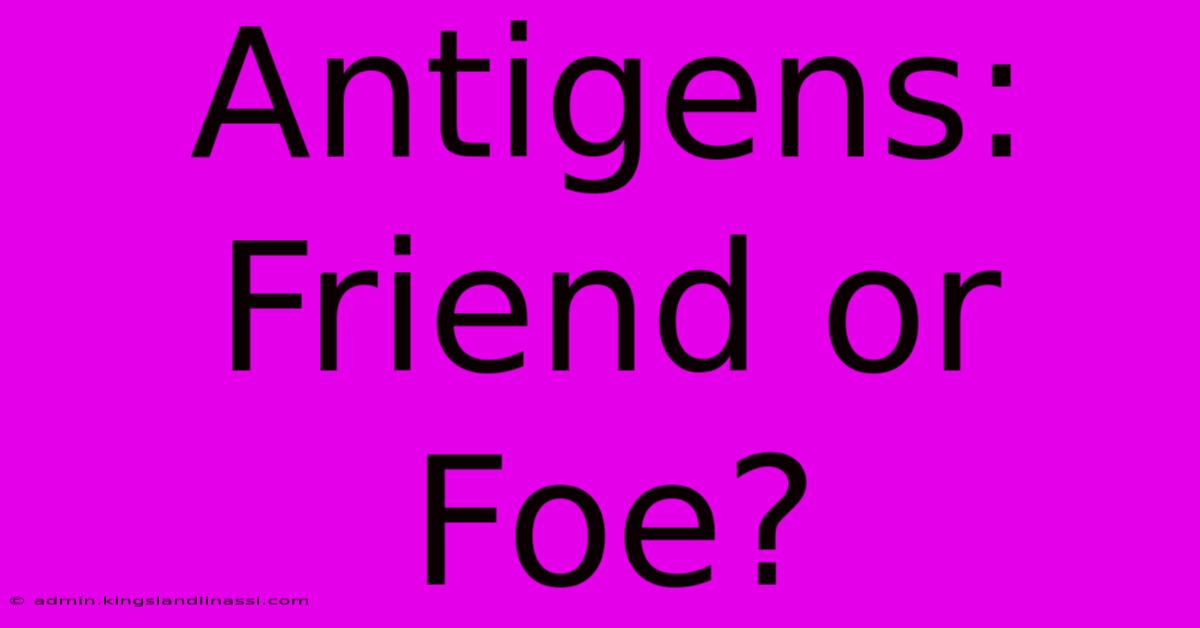Antigens: Friend Or Foe?

Table of Contents
Antigens: Friend or Foe? Understanding the Body's Response
Antigens. The word itself might sound intimidating, conjuring images of microscopic invaders. But are antigens always the enemy? The truth is more nuanced. Understanding antigens, their roles, and how our bodies interact with them is crucial to comprehending immunity and disease.
What are Antigens?
Simply put, an antigen is any substance that can trigger an immune response. This response is designed to neutralize or eliminate the perceived threat. Antigens are often found on the surface of pathogens like bacteria, viruses, fungi, and parasites. However, antigens aren't solely limited to infectious agents. They can also be found on:
- Pollen: Responsible for allergic reactions.
- Food proteins: The culprits behind food allergies.
- Transplanted organs or tissues: The reason the body might reject a transplant.
- Toxins: Harmful substances produced by bacteria or other organisms.
- Self-antigens: Ironically, the body can sometimes mistakenly recognize its own proteins as foreign antigens, leading to autoimmune diseases.
Types of Antigens
Antigens are diverse and can be classified in several ways. One common classification is based on their origin:
- Exogenous antigens: These originate from outside the body, such as those found on bacteria or viruses.
- Endogenous antigens: These are produced within the body, often as a result of viral infection or cancerous cell activity.
- Autoantigens: These are self-antigens that trigger an autoimmune response.
The Immune Response: Friend in Action
When an antigen enters the body, it triggers a complex cascade of events, collectively known as the immune response. This response involves several key players:
- B cells: These produce antibodies, specialized proteins that bind to specific antigens, neutralizing them or marking them for destruction.
- T cells: These cells directly attack infected or cancerous cells or help regulate the immune response.
- Macrophages and other phagocytes: These cells engulf and destroy pathogens and other foreign substances.
The immune response is a finely tuned process, crucial for maintaining health. It's a battle between friend (our body's defense system) and foe (the antigen-carrying invader). A successful immune response eliminates the antigen, preventing illness or disease.
When Antigens Become Foes: The Case of Diseases
While the immune system is usually highly effective, things can go wrong. Antigen-driven diseases fall into several categories:
- Infectious diseases: Caused by pathogens carrying antigens that trigger an immune response. The success of the response determines whether the infection is successfully fought off.
- Autoimmune diseases: Occur when the immune system mistakenly attacks the body's own tissues and cells, recognizing self-antigens as foreign invaders. Examples include rheumatoid arthritis, lupus, and type 1 diabetes.
- Allergies: Hypersensitivity reactions to normally harmless substances like pollen or food proteins. These antigens trigger an exaggerated immune response.
Harnessing the Power of Antigens: Vaccines
The understanding of antigens has led to groundbreaking advancements in medicine, most notably vaccines. Vaccines introduce a weakened or inactive form of an antigen, allowing the body to build immunity without causing disease. This prepares the immune system to quickly and effectively respond if it encounters the real antigen in the future.
In Conclusion:
Antigens are not inherently "good" or "bad." Their role depends entirely on the context. While they can trigger diseases, understanding their nature has enabled us to develop powerful tools like vaccines, helping us protect ourselves from harmful pathogens. The ongoing research into antigens and the immune response promises further advancements in disease prevention and treatment. The complex interplay between antigen and immune response remains a fascinating area of scientific exploration.

Thank you for visiting our website wich cover about Antigens: Friend Or Foe?. We hope the information provided has been useful to you. Feel free to contact us if you have any questions or need further assistance. See you next time and dont miss to bookmark.
Featured Posts
-
Unmasking Tommy Moons Father A Family Secret Exposed
Apr 28, 2025
-
Blood Pressure Goals By Age Achieve Your Best Health
Apr 28, 2025
-
Rashmika Mandannas Age A Popular Search Revealed
Apr 28, 2025
-
Molly Martin A Fathers Love A Daughters Heart
Apr 28, 2025
-
Discovering Sivasri Skandaprasads Age The Quest Begins
Apr 28, 2025
